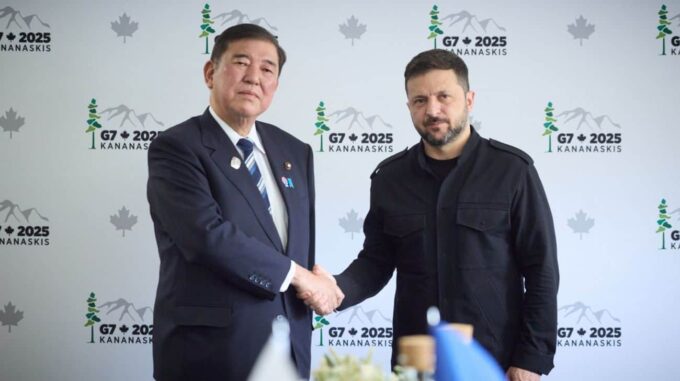Zelensky held an important meeting with Japanese Prime Minister Kishida, during which they discussed threats related to Russia, North Korea, and Iran, and emphasized the need to strengthen international sanctions

As part of this year's G7 summit taking place in Canada, Ukrainian President Volodymyr Zelensky met with Japanese Prime Minister Fumio Kishida. This meeting became a significant platform for discussing pressing international security issues, including those concerning Russia's cooperation with countries that may pose substantial threats to global stability. According to information from the official website of Ukraine's head of state, Japan has already provided Ukraine with significant humanitarian and financial assistance. An agreement signed this month between Ukraine and Japan foresees the allocation of $3.3 billion from frozen Russian assets to the Ukrainian budget. This was made possible through the persistence of the Ukrainian side and support from the international community. During the meeting, Prime Minister Kishida recalled that Japan has already provided Ukraine with aid exceeding $12 billion, serving as a clear testament to Japan’s support for Ukraine's efforts to defend its territorial integrity and independence. Regarding Japan's position on the ongoing conflict, Kishida emphasized Japan’s unwavering support for Ukraine and its commitment to quick establishment of a lasting and just peace. He assured that Tokyo would continue active cooperation with the international community, including G7 countries, and do everything possible to facilitate joint efforts supporting Ukraine. The talks also focused on issues of global security, particularly potential threats emerging from Russia’s activity in the Asian region. Additionally, the leaders discussed cooperation in defense and possibilities for direct investments in drone manufacturing and modern defense equipment. Zelensky also informed his interlocutor about Ukraine’s key defense needs and called on Japan to join projects related to the country’s reconstruction and recovery after destructive hostilities. The discussion also covered prospects for cooperation in reconstruction programs, specifically Japanese companies’ interest in investing in Ukraine’s infrastructure, housing, and industrial facilities. Zelensky highlighted that such projects are vital not only for the rapid return of Ukraine to normal life but also for creating new jobs and stimulating the economy. It is noteworthy that before and during the summit, the Ukrainian leader actively commented on the international aspect of the conflict and the possibilities for international players to pressure Russia into ending its aggression. For instance, on Tuesday, Zelensky addressed G7 summit participants with a statement that the United States has sufficient leverage to force Russia to peace, emphasizing Donald Trump’s role in this process and calling for active cooperation with the American politician. The Ukrainian head of state added that to achieve a quick and just peace, it is necessary to increase pressure on Russia through stronger sanctions and international isolation. Remaining consistent in its support for Ukraine, the international community, in Zelensky’s view, must apply the harshest measures to halt the war and restore stability in the region. After the foreign ministers and leaders of the world's most developed economies concluded their meetings, including German Chancellor Olaf Scholz and French President Emmanuel Macron, calls were made for further strengthening sanctions and pressure on Russia. They stressed that only joint efforts can compel the aggressor to return to diplomatic conflict resolution and ensure lasting peace. Thus, during the summit in Canada, Ukraine received an important political signal of support from international partners. Zelensky emphasized that further cooperation with Japan and G7 countries should create conditions for enhancing Ukraine’s defense capabilities, restoring destroyed infrastructure, and seeking long-term peace solutions. Such actions are key to ending the aggression and returning Ukraine to peaceful and stable life, with prospects of entering the future with new opportunities and the support of the global community.

